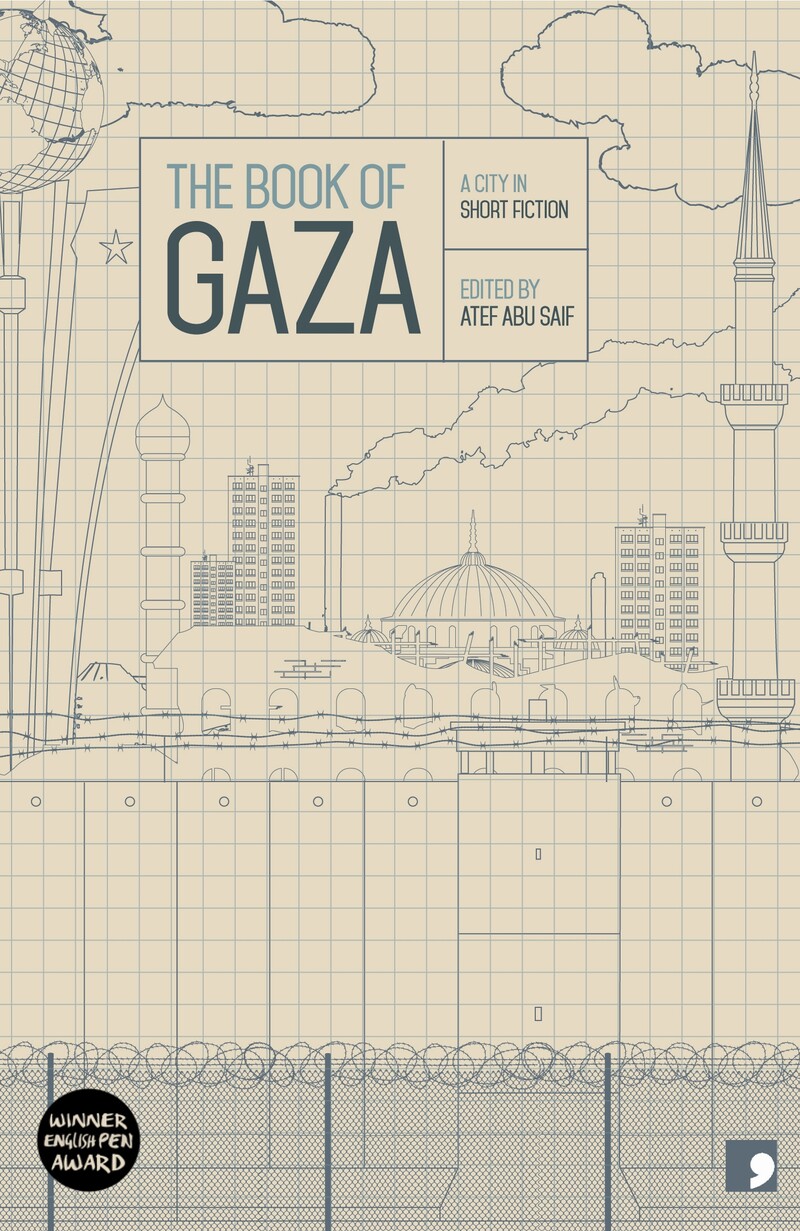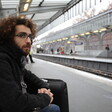The Electronic Intifada 11 July 2014

Gaza is a place of secrets, whispers, anonymous letters, hidden touches, chided laughter, dull rooms; where lovers are yearned for and arbitrarily dismissed. Workers queue and travelers are turned back. Strangers cry at checkpoints. It is a place of tender embraces, sudden impulses to kill, to protect, to betray. Gaza is a place of numbers and counting, a place where graffiti slogans can be divided into two categories: the narrative and the rhetorical.
The Book of Gaza (Comma Press, 2014), a beautifully presented collection, with a fresh geometric Etch-a-Sketch cover by David Eckersall, is a discovery of Gazan voices, rich with stories and emotion. Gaza, the editor and contributor Atef Abu Saif writes in the introduction, once became known for exporting “oranges and short stories,” and it is possible to see why the form suits the place, with the harshness of realities curtailing actions and encounters, prohibiting relationships and monitoring conduct. Gaza, through this collection, is a place of limitless aspirations and yearning hearts, a terrain where the young love with the desperation of eighteenth century European poets and can endure military beatings and attacks with a combination of resigned stoicism and contemptuous rage.
It is some of the shorter, more constrained pieces that work best in this collection, such as the elegance and subtlety of Talal Abu Shawish’s “Red Lights” (translated by Alice Guthrie) which, in less than three pages, captures the pathos and frustration of a people through the voice and actions of a taxi driver.
Yusra al Khatib’s “Dead Numbers” (translated by Emily Danby), of a similar length, is taut with anxiety, doubt and desire, written from a place where time seems endless and options limited. Her story, capturing a moment few people have not experienced — wondering whether to call or not to call — makes the piece universal. It skillfully focuses on momentary doubt in a manner similar to the attention to the moment found in the work of Lydia Davies.
Gutsy
“Two Men” by Abdallah Tayeh, another short piece, creates dialogue that captures courtesy riddled with inherent distrust. The story’s ending is a surprise that the reader needs to revisit as it reflects on the nature of prejudices and preconceptions, for the revelation in the simple final scene questions the role of beauty and history in a place of urgency and conflict.
The Book of Gaza contains some of the gutsiest writing by women about being women in Gaza that I have come across. “The Whore of Gaza,” by Najlaa Ataallah (translated by Sarah Irving), is filled with eroticism and narcissism with a sharp knowledge of the power that physical female beauty can wield.
The protagonist in this story swears, “Shit! Fuck!” touches herself, “her hands set to work again, this time sliding down [her breasts] to her navel,” yearns for a man like the portraits stuck on her wall, consorts with a married man, but is ultimately virtuous (her “payment” ends up going to a mosque, her hymen remains intact). “What do you expect me to do with this yearning? With these looks?”
Internal scream
Is the internal scream against society here, as the protagonist sheds tears after driving herself mad with physical desire, tries to smoke but does not know how, before transforming herself before her plaintive lover.
“Sir?!” he exclaims. “Darling, what happened during the hour I kept you waiting? For as long as I’ve known you you’ve never called me ‘sir.’”
“That was in the past,” comes the reply.
The contents of the book do not always live up to the modernity and uncluttered nature of the cover, but this is an important collection with many exciting voices and much talent unexperienced previously by English language readers. Some of the stories in this collection appear too full to be just stories.
The voices in these stories are too rich with characters, backstory and intersecting lives to be able to fit well into the constraints of the form. Abridgments and time changes can, on occasion, confuse. A stronger editorial hand could have resolved the untenably high level of ambiguity that weakens some of the stories in this collection, although the book’s inclusion of pieces that had been previously published would have diminished the editor’s ability to consult with the writers about their works.
Whispered explanations
Mona Abu Sharekh’s short story “When I Cut Off Gaza’s Head” (translated by Adam Talib) reads like a summary. The characters are intriguing, but there are too many events in the piece for emotional engagement to develop.
The subject matter suits a novel in two voices. This story portrays the disgust of the narrator, an artist, for the judgments cast upon her by others, “Why does he come to me when he needs money if I’m the filth of Satan’s making?” but also communicates the burden of stories placed on women by other women and their numerous unseen sacrifices, “because getting married and moving away would mean my disabled brother would have to beg in the street, because my father no longer works,” being one of these whispered explanations.
“You and I,” by Asmaa Al Ghul (translated by Alexa Firat), is the thoughts of a student: the missing of another, the longing to have them back, wondering how it ended. It is written in the style of a late-night diary entry to be slipped under a pillow and contains the following account of a story told at a checkpoint, “about the man who wept silently while still managing to tell everyone his story: The glass eye my son got after being struck by a bullet fell yesterday onto his schoolbook in front of his classmates,” which I personally found so upsetting I avoided the page it was written on and had to force myself to go back to it.
The editors’ judgment was right to end with Zaki al ‘Ela’s “Abu Jaber Goes Back to the Woods” (translated by Max Weiss), which kicks off with the line, “His appearance: those damn pyjamas. They would be his downfall,” and ends with a paragraph as haphazard as the thoughts of the narrator in the opening line, a clipped jumpy style, depicting hope and endurance in the face of brute military force:
“A tree bursting with water and blood, a trunk made out of water and mud and blood. His stares just hang there. The pitch-blackness grows darker still, spinning.
“Suffocation.”
The editors, writers, translators and supporters of this publication should be commended for bringing Gaza to life in such an unexpected and vibrant way.
Selma Dabbagh is a British-Palestinian writer. Her debut novel is Out of It is published by Bloomsbury (2012).





